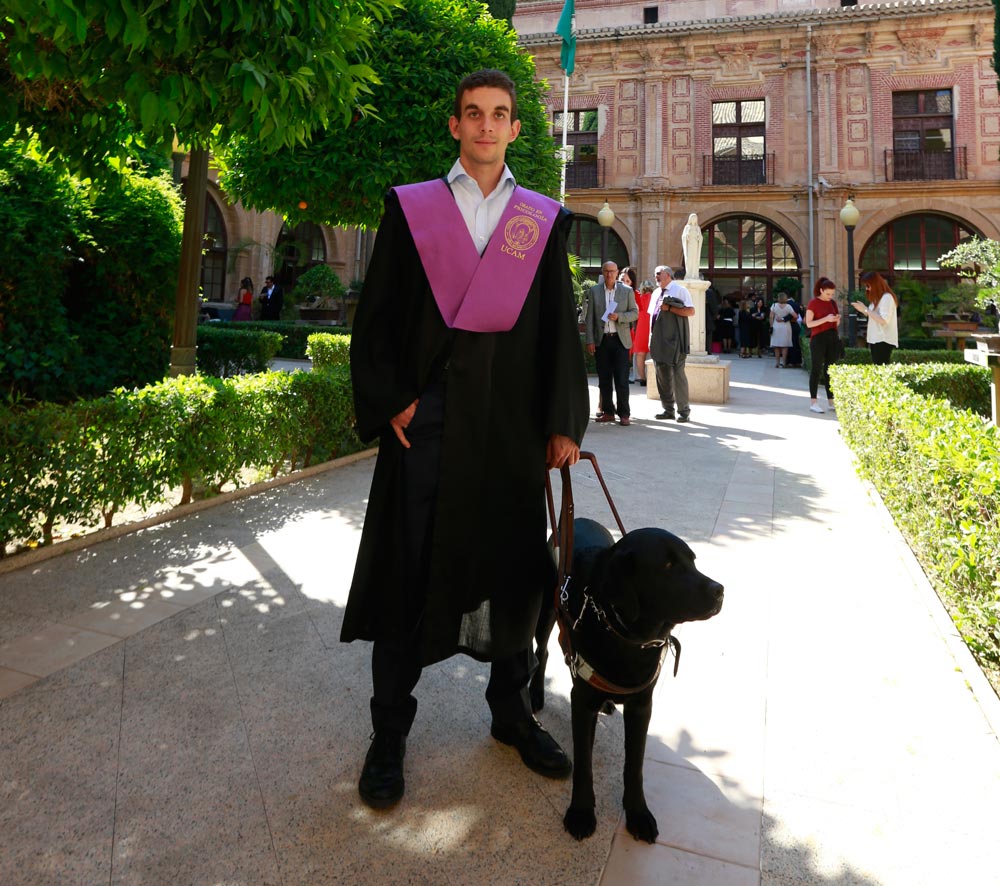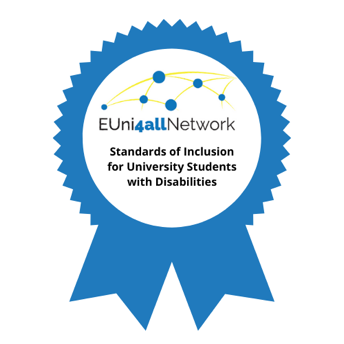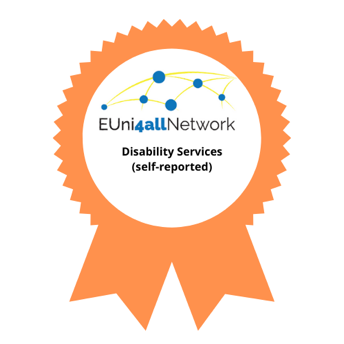

The EUni4ALL-NETWORK project
Within the ERASMUS+ program, a group of European entities and universities are leading this project, entitled European Network of Inclusive Universities (EUni4All-Network), which intend to continue advancing in the construction and visibility of universities that work for inclusion. In this project participate the European Disability Forum (EDF), the ONCE Foundation for the inclusion of people with disabilities in Spain, and universities of five countries: University of Eastern Finland, the University of the Study of Trieste (Italy), the Polytechnic University of Lublin (Poland), the University of Porto (Portugal), and the Spanish universities of Murcia, Autonomous of Madrid and Seville.
The latest reports on equity and inclusion in higher education continue to reveal major gaps between policy formulation and actual implementation of inclusive education. Still very low numbers of students from disadvantaged groups, specially students with disabilities, are participating in higher education settings and engaging in mobility programs.
Euni4all – European Network of Inclusive Universities is an ERASMUS+ Program aiming at addressing these difficulties and help students make informed decisions on their mobility, through cooperative action. The Euni4all project ( https://www.euni4all-network.com/) is producing the following outputs:
- A Guide of Standards for the Inclusion of University Students with Disabilities: tool to self-evaluate the performance of you University regarding the inclusion of students with disabilities in four areas: Key institutional policies, Access, University life, Graduation (available on the website of the project)
- A Guide of Universities that work for inclusion: description of the condition offered by the universities that have participated in this project and have agreed to evaluate themselves and are share their results
- Programme and content of Training courses: address to faculty members and technical staff from universities, these courses were design to break barriers that prevent persons with disabilities to access and participate in higher education
- Web Platform: will disseminate further the information included in the Guide of Universities Working for Inclusion. This platform compiles the work reflected at European Guide of Inclusive Universities, the result of a research study done in 64 universities throughout the European Union that analyzes to which extent they are applying a set of standards of inclusion. However, the work does not end here. Universities can still participate following the instructions provided HERE.
This platform
This platform, which originated in the work carried out within the ERASMUS+ program entitled European Network of Inclusive Universities (EUni4All-Network), intends to continue growing and thus advancing further in the construction and visibility of universities that work for inclusion. In former mentioned project participate the European Disability Forum (EDF), the ONCE Foundation for the inclusion of people with disabilities in Spain, and universities of five countries: University of Eastern Finland, the University of the Study of Trieste (Italy), the Polytechnic University of Lublin (Poland), the University of Porto (Portugal), and the Spanish universities of Murcia, Autonomous of Madrid and Seville.
This platform compiles the work reflected at European Guide of Inclusive Universities, the result of a research study done in 64 universities throughout the European Union that analyzes to which extent they are applying a set of standards of inclusion. However, the work does not end here. Universities can still participate following the instructions provided HERE.
The main objective of this platform is to provide students with disabilities with a useful tool and quality information on European universities to improve decision-making concerning their studies and possible mobility.
The guide, and therebefore the platform, derive from previous work done by the partners of this project, the Guide of Standards for Inclusion for University Students with Disabilities, that was designed as a self-assessment tool for European universities on issues related to their inclusion policies.
This platform of Inclusive Universities presents information on a set of European universities that self-assessed themselves against the full or essential set of standards for the inclusion of students with disabilities. In addition, the platform is completed with general information for other set universities that, although they did not self-assess themselves against the standards, have shown their willingness to participate in the EUni4All-Network by providing basic information on issues related to their inclusion policies.
In summary this compilation, as a catalogue, presents some of the most inclusive universities in Europe, taking into consideration their key institutional policies (accessibility, normative and operational framework, training and awareness) access, university life (learning and education, participation, internships, research, international mobility) and graduation.
For students and universities
The EUni4All-Network Platform will help both students and staff at European universities.
This platform is intended to be a resource of interest to European universities, students with disabilities and non-profit organizations and how to use it depends on your profile.
If you are a member of a university community you are probably approaching this platform because you want to learn how other universities are facing the challenge of improving their equity and inclusion policies. In this case, the platform provides you with specific information about the level of compliance of the listed universities with different standards.
If you are a student planning to travel to a European university, this guide provides general information that can help you in your decision making. For example, it provides useful information about disability policies in the destination country. It also provides information on the inclusion policies and services offered by some universities in that country, contact persons/services at each university for disability-related issues, and other information of interest, such as data on the countries and fields of expertise of Erasmus students hosted by the university.
How to search ?
Start by looking at the universities that have the blue seal because they are the ones that have responded in detail to 75 or 150 questions derived of 14 or 38 indicators. They have also presented evidence of their responses. If you do not find your university in the group of those with the blue badge, search in the group of those with the orange badge.
In both groups you can search by one of two ways: simple search and advanced search.
- Simple Search
You can type the name of the university and/or search by country, region and/or city.
- Advanced Search
You can search by the same fields as the simple search, but you can also search by one of these dimensions in the blue badge group:
- Key institutional policies
- Access
- University life
- Graduation
If you are using the advanced search in the orange badge group you can search also by field such as: computer rental, interpreter services, braille transcriptions, etc. To see all the search options you only have to see the dropdown.
Methodology
One of the main objectives of the EUNI4ALL project was to identify, diagnose and analyze the quantity and quality of European universities in terms of the level of inclusion in undergraduate and graduate education, so it was necessary to take a representative sample of universities in the European Union. To this end, at the first meeting of the project, the distribution by country for the study was agreed upon.
Each partner identified and selected from each of the previously assigned countries at least two public or private universities to participate in the project. For this purpose, a professional researcher was appointed to identify the universities, based on different inclusion criteria that make these universities a benchmark and susceptible to be studied.
In the first phase of the study, each partner identified at least two public or private universities per country. For the selection of universities, we used a list from the EU Commission on all universities receiving students with disabilities, and two from SEPIE on the European universities receiving more number of students with disabilities and the top 40 EU institutions receiving the most students in mobility programmes. In addition to these criteria, each partner contacted experts who suggested other universities. Subsequently, each partner contacted some of the listed universities and proposed them to complete the initial questionnaire.
A total of 63 universities have provided data for this study so far. 24 of them have filled in a “long” questionnaire with more than 150 questions related to 38 indicators. 7 universities have completed a “short” questionnaire with questions related to 14 indicators, all taken from the “long” questionnaire, and 33 have provided us with data on the most relevant information in case a student with a disability wants to inquire and/or contact them directly.
However, more universities will participate in the future and some universities that completed only the most relevant information are invited to complete the long questionnaire in the future.
c. Identification of inspirational practices
One of the main objectives of the EUNI4ALL network is to elaborate an European Guide of Inclusive Universities that focuses on inspirational practices in the field of university inclusive education. To advance towards this goal, the results obtained from the study of the universities (quantitative and qualitative) has served to identify which universities have inspirational practices in terms of key institutional policies (accessibility, normative and operational framework, training and awareness) access, university life (learning and education, participation, internships, research, international mobility) and graduation.
BLUE AND ORANGE BADGES
- THE BLUE BADGE

The blue badge identifies the universities that have provided evidences of compliance with all or some Standards of Inclusion for University Students with Disabilities. These universities have filled in a “long” questionnaire with more than 150 questions related to 38 indicators, or a “short questionnaire” with at least 75 questions related to 14 indicators.
- THE ORANGE BADGE

The orange badge identifies universities that have provided information on the main services related to students with disabilities. They completed a simple form providing general information on critical matters related to inclusion.